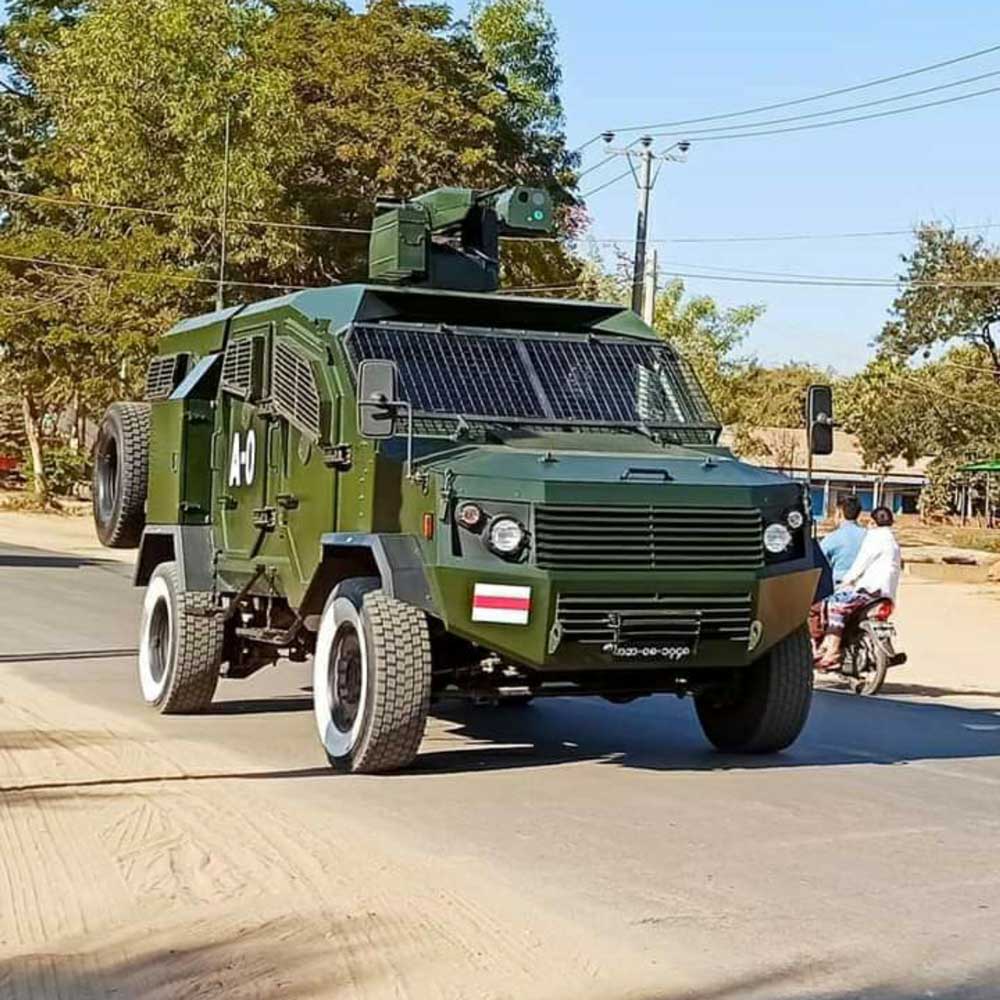Myanmar's Military Coup: How The Tatmadaw Have Clung on to Power for More Than 50 years
Myanmar's military, the Tatmadaw, continue to receive weapons from foreign countries despite humans rights abuses.
By Sarosh Bana
01 April 2021

Myanmar Coup: The countries that sell arms to Myanmar's military
February's military coup in Myanmar, which saw the country's de-facto head Aung San Suu Kyi and the president Win Myint imprisoned, and hundreds killed in a brutal crackdown, is now entering its second month.
But how much do we know about the military forces that have had a grip on power in the embattled Southeast Asian country for more than 50 years? And which countries continue to supply military hardware to Myanmar's armed forces, despite its reputation for brutal force and human rights abuses?
Aung San Suu Kyi's National League for Democracy (NLD) has served as the country's democratically elected government since 2015. The NLD was about to enter its second term after a landslide victory in last November's elections, but on February 1, the Tatmadaw, the vernacular name for Myanmar's military, ousted Aung San Suu Kyi, alongside other government members.
Public protests erupted in the capital Yangon following Aung San Suu Kyi's arrest, which the Tatmadaw quelled with brute force, resulting in more than 500 deaths.
The NLD's leader, Aung San Suu Kyi, has a complicated relationship with the country's military, which no doubt stems from the fact that this powerful well-armed force was founded by her father, the Burmese revolutionary Aung San, who is celebrated as the Father of the Nation for delivering Burma from colonial rule.
Despite the military putting her under house arrest for many years and more recently being responsible for a brutal crackdown against Myanmar's Rohingya Muslims, Aung San Suu Kyi has stated previously that she has tremendous goodwill towards the Army.
Aung San founded the Burma Independence Army (BIA) in Bangkok in 1941 with the support of Imperial Japan, which was then in occupation of Thailand. His army then helped Japan to seize Burma in 1942, when it was still a self-governing colony of the British.
Doubting Japan’s assurances of granting independence to his country, Aung San co-operated with the British and, in 1945, helped the Allies defeat the Japanese occupiers. But he never got to see his beloved Burma gain independence as he was assassinated just six months prior in July 1947 at the age of 32.
Since the country’s founding, the Tatmadaw, which literally means 'royal force,' has been deeply involved in domestic politics, running the country for five decades following a military coup in 1962.
COUNTRIES THAT SELL WEAPONS TO MYANMAR
A tremulous democratic transition began in 2011, but despite the NLD winning democratically held elections, a constitution drawn up in 2008 saw the Tatmadaw maintain control of a quarter of parliamentary seats and key ministries such as home affairs, defence and border affairs.
The Tatmadaw’s inventory in the past mostly comprised older Chinese and Soviet-era equipment, but modern acquisitions in recent years have transformed the armed forces, with major suppliers including China, Russia, Israel, Belarus, India and South Korea.
The Myanmar Navy, which largely comprises surface combatants, metamorphosed last December into a three-dimensional force upon receipt of a refurbished Soviet era Kilo class diesel-electric submarine from the Indian Navy. The Navy’s aerial defence accrues from the Swedish Bofors 40 mm and the Chinese-made ZPU-2/Type 58 anti-aircraft guns.
A 2019 UN Independent International Fact-Finding Mission on Myanmar highlighted a vast web of companies which Myanmar’s military is alleged to control.
It also highlighted revenues the military is alleged to have earned from domestic and foreign business deals that “substantially enhance its ability to carry out gross violations of human rights,” which refers to the brutal crackdown in August 2017, which killed thousands of Rohingya Muslims and forced more than 740,000 to flee Rakhine to bordering Bangladesh.
Despite knowledge of the Tatmadaw’s excesses, the UN mission claims that 14 companies from China, Russia, Ukraine, Israel, North Korea, India and the Philippines have supplied fighter jets, armoured combat vehicles, warships, missiles and missile launchers to Myanmar since 2016. It also found 59 foreign firms had commercial ties with Tatmadaw businesses.
Human Rights Watch called for a global arms embargo on Myanmar. Following the recent coup and repression, EU member states imposed economic sanctions, travel restrictions and asset freezes on high-ranking individuals within Myanmar's military.
They also stated that "pre-existing EU restrictive measures such as an embargo on arms and equipment remain in place.

HOW THE TATMADAW FUNDS ITSELF
The UN Fact-Finding Mission's report also exposed two of Myanmar’s “most opaque enterprises,” Myanmar Economic Holdings Ltd. (MEHL) and Myanmar Economic Corporation (MEC), which are allegedly owned by senior military leaders, according to the UN mission. Among them, it claims, is February's coup leader, Commander-in-Chief Senior General Min Aung Hlaing, and his deputy, Vice Senior General Soe Win.
According to the UN Fact Finding Mission, MEHL and MEC own at least 120 businesses involved in everything from construction to pharmaceuticals, manufacturing, insurance, tourism and banking,
Justice For Myanmar (JFM), “a covert group of activists campaigning for justice and accountability for the people of Myanmar,” says it has provided evidence about the Tatmadaw’s clandestine and extensive corporate set-up to the Organised Crime and Corruption Reporting Project (OCCRP), an investigative reporting platform and international media network.
JFM claim that income from MEC and MEHL are not disclosed to parliament, leading to a massive loss of public funds, which it alleges the military can utilise off-budget.
Additional reporting by Anita Hawser